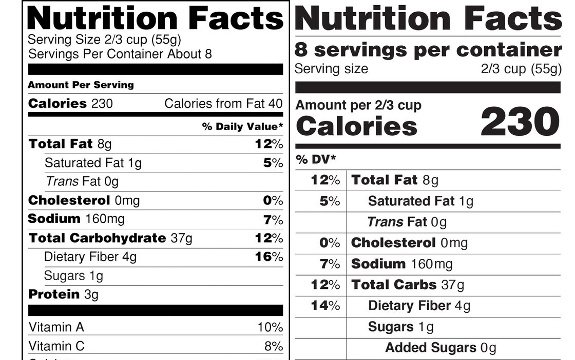FDA Delivers New Food Labels, But GMO Labels are Missing…

 It’s been a few decades since the nutrition labels on U.S. foods have been changed significantly. This week, the FDA released the new-and-improved labels, which they say will make it easier for Americans to make healthy decisions. It’s true, these changes are positive, but there is at least one glaring omission.
It’s been a few decades since the nutrition labels on U.S. foods have been changed significantly. This week, the FDA released the new-and-improved labels, which they say will make it easier for Americans to make healthy decisions. It’s true, these changes are positive, but there is at least one glaring omission.
As NPR reports, First Lady Michelle Obama announced the proposed nutritional label changes on Thursday, marking the fourth anniversary of her Let’s Move Campaign. It was fitting, considering the new labels could help some people get a grip on matters like portion size and added sugars—two factors that can contribute to obesity.
What’s changed?
The new labels have bigger and bolder calorie counts. Calories are often the first thing U.S. consumers look to when they are watching their weight (thought they shouldn’t be). And while calories are important, they don’t tell the whole story.
The new labels also address portion size, bolding just how many servings there are in a container. This is an extremely positive move, as a single bottle of juice, for instance, could include two or more servings. But this fact is often missed by consumers who only glance at the nutrition info and thus dramatically underestimate what they are consuming.
Finally, the labels will include a new feature—a separate line for added sugars. Naturally occurring sugars, like those in dried fruit or grains are less detrimental to our health than added sugars like those from corn syrup and table sugar added to simply sweeten the pot. Prior to the change, all sugars were listed together.
“I’ve been hoping for years that the FDA would list added sugars,” Marion Nestle, a professor of nutrition at New York University, tells NPR. “I definitely think it’s helpful.”

So, what’s missing?
The glaring omission on U.S. food labels is whether or not they contain ingredients from genetically modified organisms. American consumers want GMOs to be labeled, but the powerful companies who use genetically modified ingredients and are scared of what such labels could mean for their bottomline have thus far fought efforts to label GMOs successfully.
Monsanto, backed with funding from DuPont and Bayer, launched a very expensive and successful campaign against Washington state’s effort to label GMOs last year. As Anthony Gucciardi reported, their power is in their pockets and with huge corporations contributing, American consumers are losing out.
Anthony Gucciardi reported on the failed labeling initiative last November:
“Perhaps most amazing to me is the fact that just $550 of the $22 million donated to fighting the GMO labeling initiative actually came from Washington citizens. To put that into perspective, that’s around .0025% of the total finances. The rest, actually came from the Grocery Manufacturers Association, Monsanto, DuPont Pioneer, Dow AgroSciences and Bayer CropScience — the same corporations who are actively dominating the food supply with all forms of genetically modified varieties.”
The newly proposed nutritional labels are nice. But they are far from groundbreaking when compared with the level of accountability and transparency Americans truly want.

Should have the chemical count on the labels, too!
Yep, GMO labeling is missing and wasn’t that the biggest cost grocer’s griped about for not labeling GMOs. High fructose corn syrup is known to put on weight.
it doesn’t list allergens in these foods. : nuts, eggs, gluten etc…